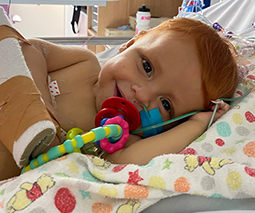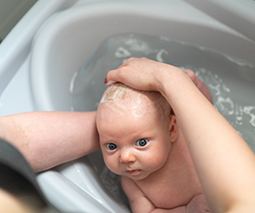Undescended testes: Everything you need to know about this newborn condition

Occasionally, baby boys are born with undescended testes – a condition that often corrects itself by six months of age.
Here are the most common questions parents ask about this condition, including everything you need to know about little boys’ testes, undescended testes, the problems with undescended testes and how this condition can be treated.
Q: What are testes and what are they for?
A: Testes or testicles are male sex glands which produce sperm and hormones for sexual reproduction.
Q: When do testes develop in the foetus?
A: In utero, the testicles form inside the male foetuses abdomen, and between the 25th and the 35th week of gestation, they usually migrate through the lower abdomen into the scrotum.
Q: Where are the testes located?
A: The testes are usually situated in the scrotum.
Q: What are undescended testes?
Testes or a testis that is not located in the scrotum are known as undescended. Undescended testes are also known as cryptorchidism. One testicle may not have descended, or sometimes both. The testicle or testes may instead be found in the groin or the lower abdomen. A baby can be born with undescended testes or they may move from the scrotum in a child’s early years.

Q: Testicle differences
A: Some boys may have a retractile testicle which can move between the scrotum and the groin due to a muscle reflex in the scrotum. It’s easily directed back to the scrotum by hand and this is not considered abnormal.
Some boys may have an ascending testicle – also called an acquired undescended testicle – which is a testicle that has moved out of the scrotum and can’t be moved back manually.
Q: How common are undescended testes?
A: Approximately 5 percent of baby boys are born with undescended testes and this condition is more common in premature or low birth weight babies.
The lower a baby’s birth weight, the higher the risk of undescended testes. Approximately 17 percent of babies weighing under 2.3kg have undescended testicles and close to 100 percent of babies weighing under 907 grams are born with this condition.
Q: What sorts of things might contribute to this condition?
Apart from low birth weight and premature birth, the following might increase the risk of undescended testes:
- A family history of genital development problems or undescended testicles.
- Conditions which may restrict foetal growth such as Down syndrome or an abdominal wall defect.
- Exposure to harmful chemicals such as pesticides.
- Alcohol intake during a mum’s pregnancy.
- Cigarette smoking during pregnancy or exposure to cigarette smoke.

Q: How are undescended testes diagnosed?
A: An undescended testicle is usually diagnosed shortly after birth when a baby is examined and assessed.
Q: What causes undescended testes?
A: The cause of undescended testes is not yet known. It’s suggested that a combination of genetics, maternal health and environmental factors during a foetus’s development may disrupt the processes that influence the development of the testicles.
Q: Do undescended testes cause pain?
A: Undescended testes do not cause any pain unless the spermatic cord attached to the testis becomes twisted.
Q: What are the signs of undescended testes?
A: The main sign of undescended testes is one testis (a single testicle) or both testes missing from the scrotum.
Q: Do undescended testes need treatment?
A: Undescended testicles usually resolve themselves and reach the scrotum by three months of age.

Q: Why do undescended testes need to be corrected?
A: A surgical procedure is required if undescended testes do not move down by themselves by six months of age. This reduces the likelihood of ongoing health issues. Let’s talk a little more on those issues:
- Undescended testicles that are not relocated to the scrotum from a young age will not produce sperm, making a boy grow up to be infertile. There are higher rates of infertility in men who were born with undescended testicles, even when they have corrective surgery.
- Having both testes undescended increases the risk of developing testosterone deficiency.
- Undescended testicles are more susceptible to injury.
- Undescended testicles increase the risk of hernia.
- The spermatic cord can become twisted and this can cut off the blood supply to the testes.
- Boys may suffer low self-esteem because their genitals look different to other boys’.
- They may also increase the risk of cancer.
Q: How are undescended testes corrected?
A: They’re corrected via a surgery called an orchidopexy (ork-id-o-peck-see).
- A general anaesthetic is given.
- An incision is made in the groin to access the testicle inside the inguinal canal (lower abdomen).
- The testicle is taken out of the inguinal canal.
- The spermatic cord that links the testicle to the body is ‘unkinked’ and gently stretched to its full length. Obstructive tissue may have to be cut away to achieve this.
- An incision is made in the scrotum.
- The testicle is placed inside the scrotum and stitched securely.
- All incisions are closed.
Source: Better Health Channel

Q: How long does undescended testes surgery take?
A: It usually takes around 60 minutes. It’s a day procedure and little patients are usually able to go home about two hours after the operation.
Q: What are the possible complications of orchidopexy
A: Complications are very rare, but could include:
- The testis not reaching the scrotum after the first operation, and the procedure needing to be repeated.
- Rarely, if the testis is very high in the abdomen or the blood supply to the testis is poor, the testis may shrink.
Q: How long does it take a child to recover from undescended testicle surgery?
A: Children recover quickly from this surgery but will need pain relief according to your doctor’s advice to remain comfortable. Rigorous activities such as bike riding, trampolining and skateboarding should be avoided until wounds have healed.
A: Does this sort of surgery cause a scar?
A small scar will result from this surgery, but it will fade quickly.
It’s best to see your GP if you are at all concerned about your baby’s testes.
Read more stories like this:
- 7 common penis problems in little boys and how to solve them
- Everything you wanted to know about little boys and their erections
- Does size really matter? A guide to what’s normal for your son’s genitalia
- Mums of little boys: Here are 7 fun facts about the penis and testicles
- Why retracting your uncircumcised baby boy’s foreskin is not a good idea
- What you need to know about caring for your little boy’s genitals
- Weighing it up: Sorting through the pros and cons of circumcision








